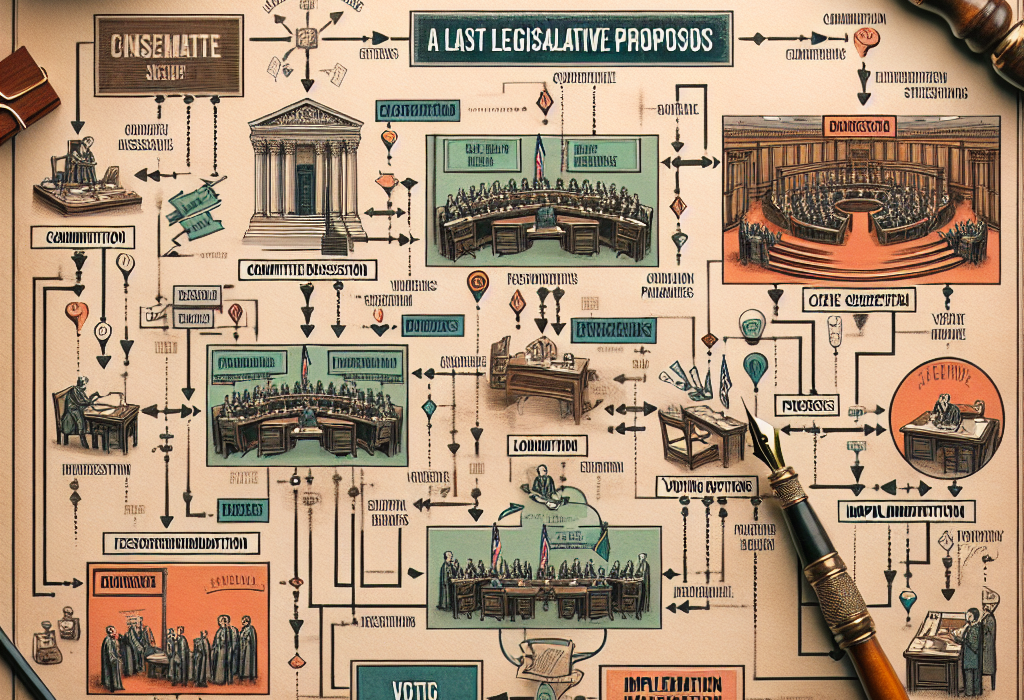In the whirlwind of modern politics, it can be challenging to keep abreast of the myriad legislative proposals churning through the halls of government. These proposals, often a cocktail of suggestions, regulations, and reforms, are pivotal to shaping the socio-economic landscape of the future. This article aims to demystify some of the most significant legislative proposals currently on the table, providing clarity on their potential impacts and the philosophical underpinnings driving them.
1. Climate Action: Green New Deals and Beyond
Legislative Overview
One of the most hotly debated topics in recent legislative sessions has been climate action. Proposals range from sweeping Green New Deal-style programs aimed at overhauling the entire economy, to more modest, incremental reforms focused on reducing greenhouse gas emissions.
Key Proposals
- Green New Deal: Inspired by FDR’s New Deal, this ambitious proposal seeks to achieve net-zero greenhouse gas emissions through broad federal investment in clean energy, infrastructure upgrades, and job creation.
- Carbon Pricing & Cap-and-Trade: Several bills propose mechanisms like carbon pricing or cap-and-trade systems to incentivize emission reductions.
- Renewable Energy Standards: Mandating a certain percentage of energy to come from renewable sources within a set period is another key element seen in many bills.
Potential Impact
Passage of robust climate action legislation could lead to a dramatic reduction in the country’s carbon footprint, foster significant job creation in new industries, and enhance energy security. However, critics argue about the costs, economic disruption, and feasibility.
2. Healthcare Reform: Expanding Coverage and Controlling Costs
Legislative Overview
Healthcare remains one of the most complex and contentious issues. Proposals here target everything from insurance coverage expansion to reigning in pharmaceutical prices.
Key Proposals
- Medicare for All: This proposal envisions a single-payer system to cover all Americans, eliminating private insurance for basic health needs.
- Public Option Plans: Less radical, these bills propose a public healthcare option that would compete with private insurance, giving consumers more choices.
- Drug Price Controls: Legislation focusing on allowing Medicare to negotiate drug prices, and introducing price caps for essential medications.
Potential Impact
Expanding healthcare coverage could ensure that all citizens have access to necessary medical services, potentially lowering overall healthcare costs in the long term. Critics, however, highlight concerns about increased taxes, government overreach, and potential declines in the quality of care.
3. Immigration Reform: Pathways and Protections
Legislative Overview
Immigration continues to be politically polarizing, with current negotiations attempting to balance border security with pathways to citizenship and humane treatment.
Key Proposals
- Pathway to Citizenship: Creating avenues for undocumented immigrants, DACA recipients, and long-term workers to gain legal status.
- Border Security Enhancements: Proposals to strengthen border enforcement through technology enhancements and increased personnel.
- Asylum and Refugee Reforms: Ensuring humane treatment and clear, efficient processing for asylum seekers and refugees.
Potential Impact
Successful immigration reform could provide stability to millions of undocumented residents, bolster economic growth by integrating workers, and reaffirm humanitarian commitments. Detractors focus on potential abuses, security concerns, and the strain on social services.
4. Economic Equality: Tackling Wage Gaps and Income Inequality
Legislative Overview
The economic disparity between the wealthy and the working class remains stark. Proposals in this arena seek to address wage gaps, promote fair labor practices, and ensure a living wage for all workers.
Key Proposals
- Minimum Wage Increases: Several bills propose raising the federal minimum wage to as much as $15 per hour.
- Labor Rights Enhancements: Strengthening unions and ensuring worker protections through better labor laws.
- Tax Reforms: Instituting higher taxes on wealth and investments to fund social programs and infrastructure.
Potential Impact
Mitigating income inequality could lead to increased consumer spending, reduced poverty rates, and a more robust middle class. Opposition often centers on the potential negative impacts on small businesses and job market fluidity.
Conclusion
Legislative proposals are the lifeblood of democracy, reflecting the evolving priorities and values of society. As these latest proposals illustrate, the road to meaningful policy change is fraught with debate and compromise. However, understanding these proposals’ core components, intentions, and projected outcomes is essential for informed civic participation. Keeping a keen eye on these developments not only empowers individuals to participate in the democratic process but also helps in anticipating and adapting to the changes that such legislation might usher in.
















Leave feedback about this
You must be logged in to post a comment.